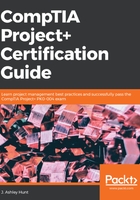
The role of the project manager
It's probably pretty easy to tell that there is a lot involved in being a project manager. I can tell you after many years as a project manager, there are days when I question the sanity of my stakeholders and, quite frankly, my own. However, the beauty of being a project manager is that we have the ability to work with different kinds of people, produce results, and essentially keep the entire ship sailing straight. It doesn't always work out like that of course, but in a perfect world, we have all the best practices, tools and techniques, and the right attitude to get to the finish line.
The role of the project manager includes the following:
- Managing the project team
- Solving problems
- Managing communications across multiple stakeholders
- Identifying and analyzing the right requirements for scope
- Creating and managing a budget and a schedule
- Identifying, analyzing, and removing threats and taking advantage of opportunities
- Understanding quality assurance and quality control as needed
- Planning effectively across multiple knowledge areas
- Utilizing effective organizational skills
Some of the soft skills that are necessary include the following:
- Leadership
- Team-building
- Communication
- Active listening
- Consensus-building
- Problem-solving
- Conflict-resolution
- Negotiation
Most of the soft skills in this list could be considered aspirational skills and it is not expected that every project manager should be an expert in all of these. As I mentioned before, there are always going to be areas where we can seek to improve our skill sets and utilize those improved skills on projects.
Even though the list of soft skills seems pretty self-explanatory, it's important to look at the skills through the eyes of a project manager in order to answer questions correctly on your exam and to implement in your day-to-day life. Let's start:
- Leadership: It involves goal-setting in a strategic manner and having the ability to lead, direct, inspire, and motivate your team of individuals. Project management exists in a global environment and it's important to be culturally aware and to be able to work with a variety of people. The leadership category is an important one because project managers need to lead by example. Just like parenting children or helping a younger sibling, leading by example helps everyone understand the rules and the processes that are acceptable within your project. Leading by example is also the ability to have a passion for your work, which will allow you to become trusted by others and interact with people from all walks of life.
- Team-building: It is an important part of project management. Trust me when I say nothing will ruin a project faster than people! If you're lucky enough to have worked with the same people for a long period of time, chances are your team is built and performing. There may be an occasional conflict or flare-up, but for the most part the team works well together already. Your job at that point is to maintain the momentum. But what if you have a brand-new team? At this point, they may be more concerned with the expectations of the project and be dependent upon the project manager to present that information. Over time, there may be some conflict before the team settles into a routine. Team-building is important during those points, to help align everyone to the goals of the project and also to develop trust in their teammates and in their project manager.
- Communication: It is another skill that is necessary to be effective in project management. That doesn't mean you have to be a chatty extrovert. It simply means that you have the ability to know and understand what you will communicate, how often you communicate information, who will receive the information, and the method by which they will receive it. You might not know it, but body language makes up 55% of face-to-face communication, 38% represents your tone of voice, and only 7% are the words you are source. When you remove the face-to-face communication, as when communicating via emails or text messages, tone becomes the prominent factor over the words that are written. If you are like me and read and re-read your emails or texts before sending them out, you are checking for tone. How people perceive you is how they will receive you. Even though you can't control others' thoughts and perceptions, you can present the message in a way that ensures the tone is considered and reviewed before pushing send.
Active listening is a skill we can all work on. Trying not to think of what you are going to say next or about other things, or being distracted by your cell phone when someone is talking is difficult in this day and age. True active listening is focusing on the message that the other person is communicating, asking questions for understanding as needed, and then responding appropriately to the message.
In summary, reaching a consensus, solving problems, reducing conflict, and being an effective negotiator are also skills to either acquire or improve upon throughout your career. I don't know a lot of people who actually enjoy conflicts, although there are those who enjoy drama. I bet somebody's name just popped into your head, didn't it? For the most part though, we are talking about functional conflict and we will cover different resolution strategies for conflict in Chapter 7, Resource Management Planning and Communication Considerations.